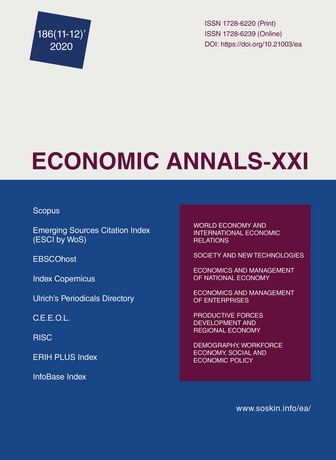Russian NFG, TNC and SOC of the oil and gas complex on the regional and world markets
Russian NFG, TNC and SOC of the oil and gas complex on the regional and world markets
Author(s): Violetta Kuzmina, Marina Parhomchuk, Irina MinakovaSubject(s): Economy, Energy and Environmental Studies
Published by: Institute of Society Transformation
Keywords: Oil and Gas Complex; national financial group; transnational company; small oil company; Russian Federation; OPEC+; Import Dependence; Majors; Sanctions Policy;
Summary/Abstract: The most powerful Russian NFG (national financial group) (Lukoil, Tatneft, Sibur Holding), transnational companies (TNCs) (Gazprom, Rosneft) and small oil companies (SOCs) (Sibir Energy PLC, West Siberian Resources) operate in the oil and gas complex. The oil and gas complex traditionally acts as a guarantor of the country’s energy security. The new economic conditions in 2021 are associated with a decrease in demand for oil and products from it, high dependence on imports, and the suspension of wells to complete a deal under OPEC ++, which will lead to a market drop by 3-10%. The purpose of the paper is to conduct a comparative analysis of Russian NFG, TNCs and SOCs in the regional and global oil and gas markets. The initial materials used to conduct the research were statistical data from the Center for Macroeconomic Analysis and Short-Term Forecasting, the Ministry of Economic Development of the Russian Federation, the Analytical Center under the Government of the Russian Federation and world rating reports. The pandemic and self-isolation of 2020 have led to a decrease in the intensity of global supply chains, affecting Russian NFGs, TNCs and SOCs in the oil and gas sector. The Russian oil and gas sector has lost 50-60% of its proceeds from the export of hydrocarbons, which is more than 50% of its capitalization. To support the industry, the Ministry of Industry and Trade of the Russian Federation will have allocated RUB 35 billion by 2024. Today, Russian NFGs, TNCs and SOCs operate in conditions of a negative damper, contraction of the domestic market, reduction of crack spreads and restrictions on production growth. Therefore, the following is relevant for them: for NFGs - search for new sales markets (for example, Asia), for TNCs - the use of innovative technologies to maintain the profitability of oil and gas production, for SOCs - development of small deposits and deposits with hard-to-recover reserves. For TNC net importers of oil from the European Union, Japan, and Korea, the electromobilization process is a potential source of economic growth. European majors, such as BP, Equinor, Shell and Total, have set decarbonization goals, transforming from oil and gas to diversified energy companies.
Journal: Економічний часопис - ХХІ
- Issue Year: 186/2020
- Issue No: 11-12
- Page Range: 21-27
- Page Count: 7
- Language: English

